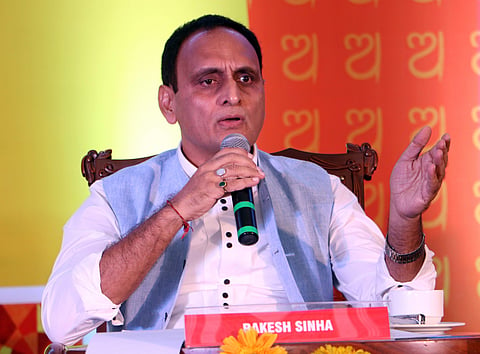

The new National Education Policy (NEP) does not impose Hindi but only proposes to teach the children in their mother tongue, said BJP Rajya Sabha MP Rakesh Sinha in a conversation with Prabhu Chawla, Editorial Director, The New Indian Express, and author and senior journalist Kaveree Bamzai on TNIE’s Expressions, a series of live webcasts with people who matter.
Sinha was debating the pros and cons of the NEP with the Congress leader MM Pallam Raju and DMK’s Rajya Sabha MP TKS Elangovan. Sinha said Hindi does not pose a threat of imposition on any Indian language, rather the real threat is from English.
“No Indian language is threatened by Hindi and neither is Hindi threatened by them. But they are all threatened by the domination of English. We are not against English — it is a very important means of communication but that does not mean you will impose it right from a child’s birth. Education in the mother tongue is considered most scientific,” he said.
Explaining why Tamil Nadu does not find the three-language set up very exciting, Elangovan said: “In 2006, we faced this problem. Kalaignar (M Karunanidhi) was the CM and he worked out a method — education will be in Tamil, but children with different mother tongues will also learn that language in the school. Everyone accepted that. We are not against any single language. We do not want one language to be imposed on us which is different from learning a language or studying in a language,” he said.
Raju said English cannot be ignored as it has become the global language and the language of opportunity. “There should not be any rigidity when it comes to language. If you see the government schools across the country, the teachers are teaching in the local language because they don’t have teachers who know English. The learning goes on. In private schools, the medium of instruction is English, and there is a lot of interest among parents to put their children in private schools and English medium schools because they see shortcomings in government schools,” the former Union minister said.
“I think we should address this imbalance and not necessarily impose the mother tongue in private schools. I am not undermining our mother tongue but I think we need to look at the languages of opportunity,” he added.
Sinha, however, said the NEP is not only progressive but also takes care of employment opportunities.
“We have to change the midset — job means self-reliance. In Gujarat, people go for self-employment after their education is complete. But on the contrary, in Bihar, people go for government jobs. The UPSC is the finest job for them. That needs to change,” said Sinha.
Commenting on the NEP’s proposal to let the top 100 global universities to set up base in India, Elangovan said: “We have opposed the idea of bringing in foreign universities even when it was proposed during the UPA 2 regime. Why should we bring in foreign universities when we have the skills.”
One of the concerns that the critics of the policy raised were that the revamp of the syllabus might lead to its “saffronisation”.
On the issue, Raju said all stakeholders should be made a part of the process.